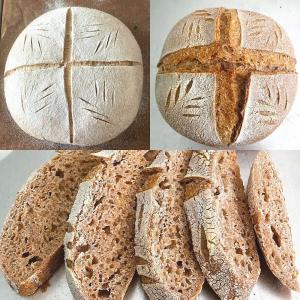Her 3-Day Sourdough Bread Sells Like Hotcakes
 |
“My bread is in very high demand in part because of gluten intolerance,” says Bromfield. “The combination of my slow fermentation and lower gluten from the ancient grains allows them to eat my bread.”
While standard sourdough bread can take a day and a half to make with 6 hrs. to rise, Bromfield’s 3-day process lets her dough rise for as long as possible. “The longer it goes, the more the gluten breaks down, the more vitamins are released, and the better it tastes,” she says. “You do have to find the sweet spot where it isn’t over-proofed.”
Bromfield follows a standard bread-making process through the first rise and first bulk fermentation. Then she puts it in a refrigerator for an extended second rise. When she takes it out of the refrigerator, it goes directly into the oven.
“It takes a lot more work, but I don’t charge more than standard breads because it’s so important to my customers,” says Bromfield.
Bromfield started out making bread in her kitchen as she experimented with different, older, heritage grains grown locally. Gradually she settled on what are called ancient grains: spelt, rye and emmer. She also uses seeds like fennel, flax, sesame and anise, as well as orange peel and caraway.
“It was a hobby, and I started posting pictures of my bread,” recalls Bromfield. “A restaurant owner asked me to make 10 loaves for a fundraiser. When he increased his order to 30 loaves, I almost flipped out.”
Suddenly she was making 30 loaves a week, mixing by hand and using her refrigerator and oven. As she got better at it, she realized she could make money baking.
As her reputation spread, she began selling to individuals at farm markets, as well as selling wholesale to restaurants. Eventually, she was baking 60 loaves a day in two ovens in her kitchen.
“I learned wholesale was more work than it was worth and made my individual customers my priority,” says Bromfield.
Over the course of a year, she saved the money she made and began investing in more professional equipment. Her first big buy was a Hobart 30/60 mixer that could make large quantities of dough. Eventually, that was followed by a Rofco oven that can bake 10 loaves at a time and an Avantco refrigeration unit. Everything was installed in her former dining room.
“The other microbakeries got me going,” she says. “Now I do about 200 loaves and pastries a week.”
Bromfield emphasizes there’s a huge demand for bread and pastries made the way she makes them. However, she advises people not to jump into a big investment, borrowing money for equipment. She also warns against responding too quickly to demand.
“It took me a year of saving my money to buy the equipment,” she says. “I’ve had so many requests to ship my bread, it’s unbelievable. I don’t do it yet, but perhaps someday.”
Bromfield admits that even with all the equipment, she may not be making minimum wage for the hours she puts in. She doesn’t mind. The payback of customer satisfaction makes up for it.
“People who are gluten intolerant get tired of eating gluten-free baked goods,” says Bromfield. “I have people start crying when they learn they can eat my bread.”
Contact: FARM SHOW Followup, Ida Bromfield, 1830 Friedensville Rd., Bethlehem, Penn. 18015 (ph 610-838-6088; breadfermented@gmail.com; www.breadfermented.com).
FARM SHOW Magazine
P.O. Box 1029
Lakeville, Minnesota 55044-1029
1-800-834-9665
©2026 Farm Show - AllRights Reserved.
